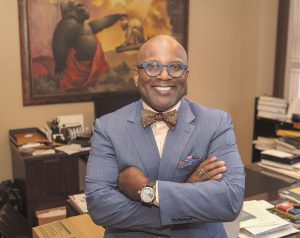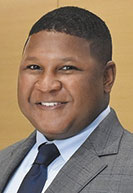Subscriber Benefit
As a subscriber you can listen to articles at work, in the car, or while you work out. Subscribe NowBeing a first and an only is something Barnes & Thornburg LLP partner Alan Mills has worked to prevent from happening ever again.
Mills’ father was a career military man, which meant he moved around a bit before graduating from high school in Indiana. Later, when his wife was enrolled at the Indiana University School of Social Work, he decided to enroll at the Indiana University Robert H. McKinney School of Law.
After graduating from IU McKinney in 1982, Mills landed at Barnes, where he became the first — and for a time, the only — Black attorney at the firm.
“There were occasions when people just said to my face, they didn’t want to work with anyone who was Black,” Mills recalled. “And that was said on multiple occasions, sometimes by clients, sometimes by employees.”
But that didn’t deter him.
“I wanted to be an equity partner at a big law firm, and at that time, there weren’t many Blacks at any of the big law firms in the United States, and so it wasn’t going to change by leaving,” he said.
A lot has changed since those days in the early 1980s, Mills said, adding that the legal profession is now more open to lawyers of color.
“I think that this firm has changed drastically, and in that regard, for the better,” he said of Barnes. “It’s had its heartaches and its changes like any institution. We’ve had our stumbles, but we’ve been fortunate to have good leadership that now has bought in to these types of issues.”
Now, Mills is preparing to pass the baton of trailblazing to the next generation when he retires at the end of 2023.
Family ties
Roughly around his sophomore year of undergrad at Carthage College in Wisconsin, Mills decided he wanted to go to law school. He had majored in political science and sociology, graduating magna cum laude in 1979.

Even before he got to Barnes, Mills was a first — the first in his family to become an attorney. His role models were his parents, he said, describing his father’s never-give-up attitude and his mother’s generosity and kindness.
“I mean, it’s easy for people to be generous when they have a lot. It’s more compelling of a story and more reflective of who they are if they’re incredibly generous and they don’t have a lot,” Mills said. “And that was my mother. We didn’t have a lot, but she was incredibly generous.”
While he was the first attorney in his family, the profession didn’t end with him. Several other family members have gone on to enter the law, including Mills’ son, Adam, an associate at Taft Stettinius & Hollister LLP.

Mills didn’t expect his son to become an attorney, he said, so Adam’s career choice was a pleasant surprise.
Growing up, Adam recalled his father emphasizing the importance of giving back and helping others. He added that being around the law his entire life was an influence on him to go to law school.
While their practice areas are different — Adam is an environmental attorney while the elder Mills works in business and finance law — Adam said he calls his dad for professional advice, which his dad is happy to provide.
“I always know he’s a good resource to go to get any type of career advice,” Adam said.
Reflecting on his childhood, and now being a new parent, Adam said he doesn’t know how his father was such an involved parent while doing all the work he does.
“Being a new parent, I appreciate it,” Adam said. “It’s something I didn’t quite understand until you’re in that situation.”
Lifting the future
Earlier in his career, Mills said he was motivated by staying true to himself and knowing what he wanted.
But in the latter half of his time at the firm, his motivation was creating opportunities for those who would come after.
Throughout his career, Mills has looked after minority attorneys through mentorship and networking and has pushed for diversity, equity and inclusion at his firm. He’s also worked on DEI issues on a national level, including serving on a diversity committee for former U.S. President Barack Obama’s campaign.
Closer to home, Barnes’ signature sponsorship program, Project Keymaker, was modeled after Mills’ personal mentorship practice. The project connects associates with partners who will invest in their careers and take a personal interest in their journeys.
Since his fight for more diversity began, Barnes & Thornburg has seen changes, and Mills is no longer an “only” — although he’ll always be a “first.”

Tiffany Presley, a partner at Barnes, said when she first came to the firm, she had mistrust for law firms in general. But Mills changed that for her.
“Alan made me a bunch of promises of how he would kind of shepherd my experience here and that he would essentially just look out for me, and he’s done that and more,” Presley said. “(Mills) has kind of morphed from recruiter to mentor to sponsor to friend.”
Sometimes, Presley said, Mills will call just to check in on her. That genuine concern for her well-being means a lot, she said.
Barnes & Thornburg would not be the same place without Mills, Presley continued, adding that he is leaving big shoes to fill as he passes the baton to the next generation.
“I think it would be such a disservice and an injustice to the trails that (Mills) has blazed if that baton has dropped,” Presley said.
In his retirement, Mills said he plans on spending more time on hobbies like collecting art and wine, listening to jazz music, and spending time with his four grandkids.
“I’ll do much more traveling, and I’ll drink my wine with a sip of bourbon every now and then,” he said.
The firm has commissioned paintings for Mills as a show of gratitude for his work.
One of the works that hangs in his corner office was given to him after he worked with minority lawyers at the firm. The painting has words like “mentor,” “catalyst” and “influence” on papers flying around musicians.
While the firm does have a mandatory retirement age of 67, Mills isn’t there yet. Instead, he just felt it was time to leave, although he does plan on taking on an of counsel role with the firm and will continue helping mentor young lawyers.
“I really am very proud of where Barnes and Thornburg is now, because I know where it was,” Mills said. “I think that it is a very welcoming place now, and it’s a place I think we’re young people, and particularly young people of color, can concentrate more on just practicing law and being successful in that realm and not have to deal with some of the other issues that I dealt with as a young African American associate with the firm.”•
Please enable JavaScript to view this content.
